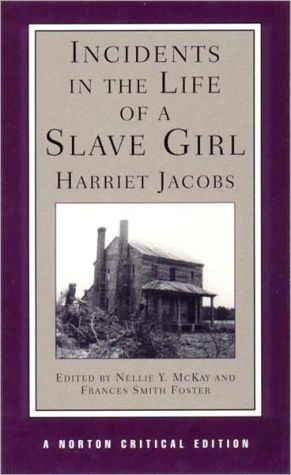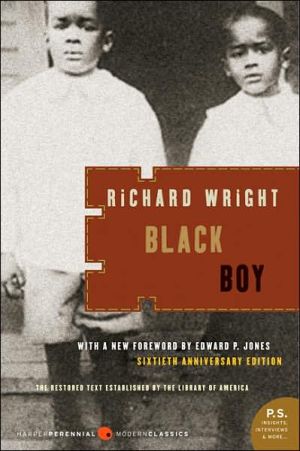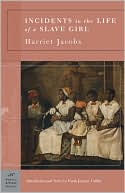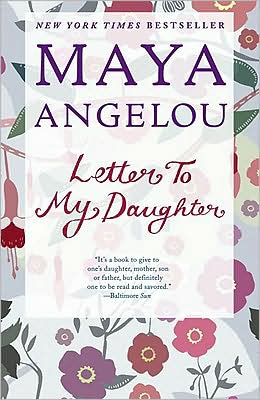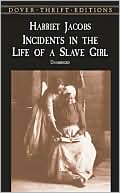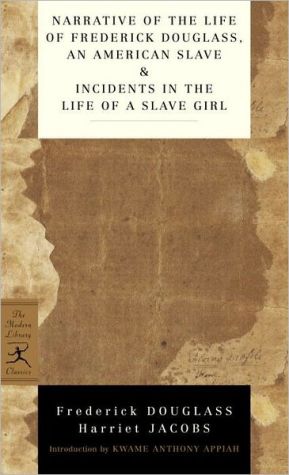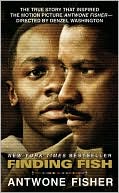Incidents in the Life of a Slave Girl (Norton Critical Edition)
Incidents in the Life of a Slave Girl is the first full-length narrative written by a former woman slave in America.\ The text is that of the 1861 first edition. Contexts includes contemporary responses to Incidents, selections from Jacobs's other published writings, and extracts from her correspondence. Criticism includes eleven important assessments of the narrative, contributed by Jean Fagan Yellin, Ann Taves, Valerie Smith, Nellie Y. McKay, Harryette Mullen, Michelle Burnham, Nell Irvin...
Search in google:
Incidents in the Life of a Slave Girl is the first full-length narrative written by a former woman slave in America.KLIATTThis is a new and enlarged edition of one of the classic female slave narratives. It includes not only the account, as first written by Harriet A. Jacobs in 1861, but a newly discovered autobiographical sketch, entitled "A True Tale of Slavery," by her brother, John S. Jacobs. He, like his sister Harriet, escaped from slavery; John was active as an abolitionist. Harriet A. Jacobs was born into slavery in North Carolina in 1813. She was a house servant, and constantly fearful of sexual predation from her master. She bore two children by another man whom her master despised. Her plight was made worse by her master's wife, whose jealousy seemed to know no bounds. Finally she ran off, and hid for seven years in a narrow part of an attic. When the opportunity arose, she was able to flee north on a steamboat, with the cooperation of its sympathetic captain. This narrative is considered one of the great works of African American women's literature. It is a book that one cannot put down, a book that is immensely informative and inspiring, a book, which, like other classic slave narratives (e.g., John Brown's Slave Life in Georgia), demonstrates the resistance of slaves to every aspect of their enslavement. White readers may cringe, for they will see the criminality behind what is called Southern "heritage," and will be stirred by a recognition of the dignity that slaves maintained by active resistance and by refusing to be brainwashed. KLIATT Codes: SA—Recommended for senior high school students, advanced students, and adults. 2000 (orig. 1987), Harvard Univ. Press, 336p, notes, index, 24cm, 99-088151, $16.95. Ages 16 to adult. Reviewer: John Rosser; Professor, Boston College,Chestnut Hill, MA, July 2000 (Vol. 34 No. 4)
Incidents in the Life of a Slave Girl\ Written by Herself \ \ By Harriet A. Jacobs \ Kessinger Publishing\ Copyright © 2004 Harriet A. Jacobs\ All right reserved.\ ISBN: 1419126253 \ \ \ Excerpt\ Chapter One\ \ Childhood.\ I was born a slave; but I never knew it till six years of happy childhood had passed away. My father was a carpenter, and considered so intelligent and skilful in his trade, that, when buildings out of the common line were to be erected, he was sent for from long distances, to be head workman. On condition of paying his mistress two hundred dollars a year, and supporting himself, he was allowed to work at his trade, and manage his own affairs. His strongest wish was to purchase his children; but, though he several times offered his hard earnings for that purpose, he never succeeded. In complexion my parents were a light shade of brownish yellow, and were termed mulattoes. They lived together in a comfortable home; and, though we were all slaves, I was so fondly shielded that I never dreamed I was a piece of merchandise, trusted to them for safe keeping, and liable to be demanded of them at any moment. I had one brother, William, who was two years younger than myself - a bright, affectionate child. I had also a great treasure in my maternal grandmother, who was a remarkable woman in many respects. She was the daughter of a planter inSouth Carolina, who, at his death, left her mother and his three children free, with money to go to St. Augustine, where they had relatives. It was during the Revolutionary War; and they were captured on their passage, carried back, and sold to different purchasers. Such was the story my grandmother used to tell me; but I do not remember all the particulars. She was a little girl when she was captured and sold to the keeper of a large hotel. I have often heard her tell how hard she fared during childhood. But as she grew older she evinced so much intelligence, and was so faithful, that her master and mistress could not help seeing it was for their interest to take care of such a valuable piece of property. She became an indispensable personage in the household, officiating in all capacities, from cook and wet nurse to seamstress. She was much praised for her cooking; and her nice crackers became so famous in the neighborhood that many people were desirous of obtaining them. In consequence of numerous requests of this kind, she asked permission of her mistress to bake crackers at night, after all the household work was done; and she obtained leave to do it, provided she would clothe herself and her children from the profits. Upon these terms, after working hard all day for her mistress, she began her midnight bakings, assisted by her two oldest children. The business proved profitable; and each year she laid by a little, which was saved for a fund to purchase her children. Her master died, and the property was divided among his heirs. The widow had her dower in the hotel, which she continued to keep open. My grandmother remained in her service as a slave; but her children were divided among her master's children. As she had five, Benjamin, the youngest one, was sold, in order that each heir might have an equal portion of dollars and cents. There was so little difference in our ages that he seemed more like my brother than my uncle. He was a bright, handsome lad, nearly white; for he inherited the complexion my grandmother had derived from Anglo-Saxon ancestors. Though only ten years old, seven hundred and twenty dollars were paid for him. His sale was a terrible blow to my grandmother; but she was naturally hopeful, and she went to work with renewed energy, trusting in time to be able to purchase some of her children. She had laid up three hundred dollars, which her mistress one day begged as a loan, promising to pay her soon. The reader probably knows that no promise or writing given to a slave is legally binding; for, according to Southern laws, a slave, being property, can hold no property. When my grandmother lent her hard earnings to her mistress, she trusted solely to her honor. The honor of a slaveholder to a slave!\ To this good grandmother I was indebted for many comforts. My brother Willie and I often received portions of the crackers, cakes, and preserves, she made to sell; and after we ceased to be children we were indebted to her for many more important services.\ Such were the unusually fortunate circumstances of my early childhood. When I was six years old, my mother died; and then, for the first time, I learned, by the talk around me, that I was a slave. My mother's mistress was the daughter of my grandmother's mistress. She was the foster sister of my mother; they were both nourished at my grandmother's breast. In fact, my mother had been weaned at three months old, that the babe of the mistress might obtain sufficient food. They played together as children; and, when they became women, my mother was a most faithful servant to her whiter foster sister. On her death-bed her mistress promised that her children should never suffer for any thing; and during her lifetime she kept her word. They all spoke kindly of my dead mother, who had been a slave merely in name, but in nature was noble and womanly. I grieved for her, and my young mind was troubled with the thought who would now take care of me and my little brother. I was told that my home was now to be with her mistress; and I found it a happy one. No toilsome or disagreeable duties were imposed upon me. My mistress was so kind to me that I was always glad to do her bidding, and proud to labor for her as much as my young years would permit. I would sit by her side for hours, sewing diligently, with a heart as free from care as that of any free-born white child. When she thought I was tired, she would send me out to run and jump; and away I bounded, to gather berries or flowers to decorate her room. Those were happy days - too happy to last. The slave child had no thought for the morrow; but there came that blight, which too surely waits on every human being born to be a chattel.\ When I was nearly twelve years old, my kind mistress sickened and died. As I saw the cheek grow paler, and the eye more glassy, how earnestly I prayed in my heart that she might live! I loved her; for she had been almost like a mother to me. My prayers were not answered. She died, and they buried her in the little churchyard, where, day after day, my tears fell upon her grave.\ I was sent to spend a week with my grandmother. I was now old enough to begin to think of the future; and again and again I asked myself what they would do with me. I felt sure I should never find another mistress so kind as the one who was gone. She had promised my dying mother that her children should never suffer for any thing; and when I remembered that, and recalled her many proofs of attachment to me, I could not help having some hopes that she had left me free. My friends were almost certain it would be so. They thought she would be sure to do it, on account of my mother's love and faithful service. But, alas! we all know that the memory of a faithful slave does not avail much to save her children from the auction block.\ After a brief period of suspense, the will of my mistress was read, and we learned that she had bequeathed me to her sister's daughter, a child of five years old. So vanished our hopes. My mistress had taught me the precepts of God's Word: "Thou shalt love thy neighbor as thyself." "Whatsoever ye would that men should do unto you, do ye even so unto them." But I was her slave, and I suppose she did not recognize me as her neighbor. I would give much to blot out from my memory that one great wrong. As a child, I loved my mistress; and, looking back on the happy days I spent with her, I try to think with less bitterness of this act of injustice. While I was with her, she taught me to read and spell; and for this privilege, which so rarely falls to the lot of a slave, I bless her memory.\ She possessed but few slaves; and at her death those were all distributed among her relatives. Five of them were my grandmother's children, and had shared the same milk that nourished her mother's children. Notwithstanding my grandmother's long and faithful service to her owners, not one of her children escaped the auction block. These God-breathing machines are no more, in the sight of their masters, than the cotton they plant, or the horses they tend.\ \ \ Continues... \ \ \ \ Excerpted from Incidents in the Life of a Slave Girl by Harriet A. Jacobs Copyright © 2004 by Harriet A. Jacobs. Excerpted by permission.\ All rights reserved. No part of this excerpt may be reproduced or reprinted without permission in writing from the publisher.\ Excerpts are provided by Dial-A-Book Inc. solely for the personal use of visitors to this web site. \ \
Childhood8The New Master and Mistress11The Slaves' New Year's Day16The Slave who dared to feel like a Man17The Trials of Girlhood26The Jealous Mistress28The Lover33What Slaves are taught to think of the North39Sketches of neighboring Slaveholders41A Perilous Passage in the Slave Girl's Life47The new Tie to Life51Fear of Insurrection55The Church and Slavery59Another Link to Life65Continued Persecutions68Scenes at the Plantation73The Flight80Months of Peril83The Children Sold88New Perils92The Loophole of Retreat95Christmas Festivities98Still in Prison100The Candidate for Congress103Competition in Cunning105Important Era in my Brother's Life109New Destination for the Children113Aunt Nancy118Preparations for Escape122Northward Bound129Incidents in Philadelphia132The Meeting of Mother and Daughter135A Home Found138The Old Enemy again140Prejudice Against Color143The Hairbreadth Escape145A Visit to England149Renewed Invitations to go South151The Confession153The Fugitive Slave Law154Free at Last159Appendix165
\ KLIATTThis is a new and enlarged edition of one of the classic female slave narratives. It includes not only the account, as first written by Harriet A. Jacobs in 1861, but a newly discovered autobiographical sketch, entitled "A True Tale of Slavery," by her brother, John S. Jacobs. He, like his sister Harriet, escaped from slavery; John was active as an abolitionist. Harriet A. Jacobs was born into slavery in North Carolina in 1813. She was a house servant, and constantly fearful of sexual predation from her master. She bore two children by another man whom her master despised. Her plight was made worse by her master's wife, whose jealousy seemed to know no bounds. Finally she ran off, and hid for seven years in a narrow part of an attic. When the opportunity arose, she was able to flee north on a steamboat, with the cooperation of its sympathetic captain. This narrative is considered one of the great works of African American women's literature. It is a book that one cannot put down, a book that is immensely informative and inspiring, a book, which, like other classic slave narratives (e.g., John Brown's Slave Life in Georgia), demonstrates the resistance of slaves to every aspect of their enslavement. White readers may cringe, for they will see the criminality behind what is called Southern "heritage," and will be stirred by a recognition of the dignity that slaves maintained by active resistance and by refusing to be brainwashed. KLIATT Codes: SA—Recommended for senior high school students, advanced students, and adults. 2000 (orig. 1987), Harvard Univ. Press, 336p, notes, index, 24cm, 99-088151, $16.95. Ages 16 to adult. Reviewer: John Rosser; Professor, Boston College,Chestnut Hill, MA, July 2000 (Vol. 34 No. 4)\ \ \ \ \ Library JournalPublished in 1861, this was one of the first personal narratives by a slave and one of the few written by a woman. Jacobs (1813-97) was a slave in North Carolina and suffered terribly, along with her family, at the hands of a ruthless owner. She made several failed attempts to escape before successfully making her way North, though it took years of hiding and slow progress. Eventually, she was reunited with her children. For all biography and history collections. Copyright 2001 Cahners Business Information.\ \
